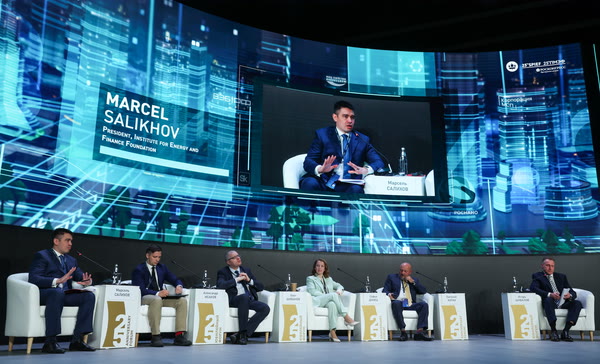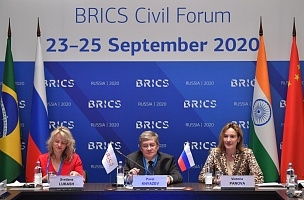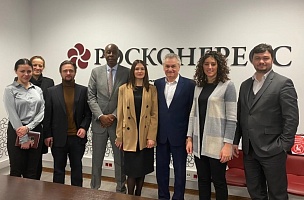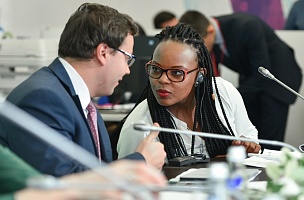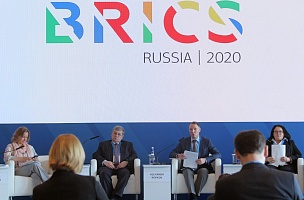The state has to help business to build trust
“The life of Russian business today is built entirely around distrusting the state. This needs to end altogether. My position is very simple (and it is not just mine, it is the position of the entire Stolypin Club, and a large number of businessmen): my friends, leave business alone, just let it be. You do not have to give businessmen anything now, just step back and do not interfere with their work. The second point is we have to deregulate as much as possible. Look, wake up any banker or any businessman in the middle of the night and quietly whisper “115-FZ” in their ear. Some of them will die immediately of a heart attack. Some, so to speak, are apparently very restrained people. We need to radically revise these issues, because, after all, we have copied this law from the international AML law [legislation against money laundering – Ed.] Well, we probably need to do something about it. In general, we need to radically revise the legislation, which today obviously looks anachronistic. ...Our business needs, above all, a simplification of the tax regime, primarily in the field of deep processing,” Evgeny Kogan, Professor, National Research University Higher School of Economics.
Wellbeing of households has to take priority over general GDP growth
“I agree, by the way, that the fight against poverty in its various manifestations can turn into economic growth. It can be a GDP growth, or the well-being of an individual family. No matter how you measure it, it is development, one way or another. It has become quite popular now (by the way, yesterday Elvira Nabiullina [Chairman of the Central Bank of Russia – Ed.] talked about it) that we should not focus exclusively on the GDP growth. First of all, we should look at how the family welfare changes against the background of economic development. And if GDP is growing, but the welfare of the family does not change, then who needs such growth? We at VEB certainly understand this, so we have launched a special project called the urban quality of life index, and this index is dedicated to this measure,” Igor Shuvalov, Chairman, VEB.RF.
“Our labour market is gradually changing. People are leaving the corporate world for a more informal sector. The question now is how do we provide them with an opportunity to start their own businesses through tax preferences. Allowing them to manage their own small companies will be key for overall well-being. For GDP growth this may not be the most important thing, [but] for the wellbeing of the citizens it is extremely important,” Oleg Shibanov, Academic Director of the SKOLKOVO-NES Centre for Research in Financial Technologies and Digital Economy, Professor of Finance at New Economic School (NES).
“We need to focus on defeating poverty. We are doing a lot for this now. We have targeted payments and so on. <...> Unfortunately, poverty is an extremely multidimensional problem. There is no simple solution to it, but we need to try, perhaps, to use taxation more actively [in the labour sphere],” Alexander Isakov, Chief Economist for Russia, VTB.
PROBLEMS
Technical development of the country requires quality education
“Our system of vocational education and training has been destroyed, it almost ceased to exist. We need to recreate it and make it really appealing to people. We have integrated into the global economy, but, unfortunately, we are currently diverging from it. We need to do import substitution, we need to rebuild factories. And then we need those very people, [we need] to invest in them. Both engineering and technical personnel, and the craftsmen – that is probably the most important people. You need to invest in them, and it will pay off,” Evgeny Kogan, Professor, National Research University Higher School of Economics.
“We have a slight slippage in terms of science in schools. We start teaching it later, and we do not teach it as well as in technologically leading countries. <...> If we want to be a real technological power, we need to give these technological skills to children much more seriously, and do it earlier,” Alexander Isakov, Chief Economist for Russia, VTB.
SOLUTIONS
The state needs to nurture private business and help fill the void in the labour market
“I think that the oil and gas sector will face restrictions, but they are surmountable. Those sanctions on oil and gas, they lead to export reduction in physical volumes, but prices remain high. And, most likely, commodity prices will be quite high in the coming years. But there is a surplus in terms of production. There will most likely be excess capacity in oil and in gas. In my opinion, this creates excellent opportunities to develop the next level of processing sectors. One option to monetize gas is to develop petrochemicals. Subsequently, the transportation of the end product becomes easier in a sense,” Marcel Salikhov, President, Institute for Energy and Finance Foundation.
“In developing countries, which Russia belongs to, infrastructure plays a very important role. Unfortunately, a lot of effort has to be spent on it by the government. Here you will not see that private business is coping entirely well with both physical and financial infrastructures. So, the government's involvement in this development will be very large and, hopefully, very confident and effective,” Oleg Shibanov, Academic Director of the SKOLKOVO-NES Centre for Research in Financial Technologies and Digital Economy, Professor of Finance at New Economic School (NES).
“Even in this difficult economic situation we find ourselves now, we still are in an economy where the unemployment rate is 4%. This means that now we are facing a deficit in the labour market. It means we only have a small untapped labour force to include. We are not an agricultural economy where you can bring people "from the fields" and train them. We are past that stage. It is important for us now not to fall back into that pattern, [to return to] some kind of outdated growth model. It is, for instance, what the Asian Tigers are demonstrating, and everyone wants to follow those examples. But here, I think it is dangerous to fall into that model. We do not have those resources, we do not have the resources to bring people "from the fields" or even from some remote areas. We need to build a new model and see where we will really have, as they say, points of growth. I believe that we should not build the past, but build the future,” Sofya Donets, Chief Economist for Russia and CIS, Renaissance Capital.
For more information, visit the Roscongress Foundation’s Information and Analytical System roscongress.org.


